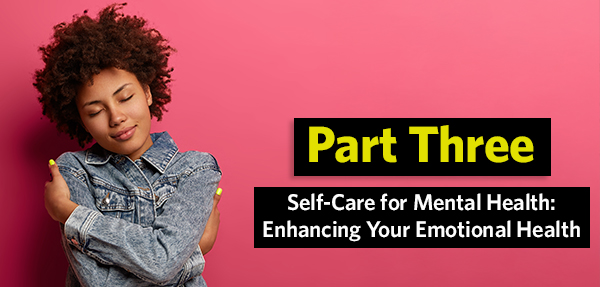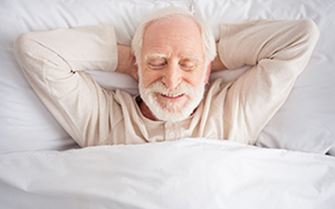Published: 5th June 2025.
Last updated: 5th June 2025.
Author: Cara Sherratt.
Contents

As discussed in Part 1 and Part 2, we understand that sometimes getting out of bed can feel difficult, so how do we begin to achieve small acts of self-kindness or self-care? We’ve pulled together more self-care ideas that are designed to boost confidence, encourage achievements and inject positivity during times of stress or difficulty.
In this blog, we’ll cover examples of everyday inputs and outputs and the impact that these can have on your wellbeing and mental health. From usage of social media to acts of kindness, dietary influences to setting boundaries - explore positive strategies that can help to align what you take in and put out with your mental health goals.
If you missed the previous blogs, click here for part one and click here for part two to discover more tips and strategies for improving emotional wellbeing through achievable acts of self-care.
Online Environments & Social Media
Social media has been proven to influence individuals, their mood and their mental health. On the one hand, social media can help us feel more connected to others, boost self-esteem, and even provide a sense of belonging for a large variety of people. However, these platforms can also create feelings of stress; a pressure to compare ourselves to others, and potentially fuel feelings of anxiety, depression and isolation. Excessive or heavy use of social media platforms paired with unfiltered, addictive content can exacerbate existing negative feelings. It is important that all users of social media remain mindful about how these platforms are used and the content we absorb, is key to making it a positive experience.
A good place to start when looking to address your digital footprint and reduce your overall intake of social media could be by checking your screen time and setting personal or mobile usage limiters on your phone for any of your social media apps. You can also be mindful of your social media intake before periods of rest, to help improve sleep and in turn, mental health.
However, if you are among those who also experience positive connections through social media and would like to continue to access these platforms, there are several ways that you can take back a little bit of control over the content that you are being served.
On platforms including Instagram and Facebook, you can go through the creators that you follow or are friends with and remove, mute or block any accounts that make you feel jealous, bad, or encourage you to compare yourself negatively. Take a second to consider what things make you happy and seek out accounts that provide that type of content specifically. For example, you could potentially swap out influencer accounts that might encourage plastic surgery or set unachievable beauty standards for an account that discovers the best dog walks in the country.
TikTok in particular has released tools to help protect users from potentially harmful or offensive content. One strategy is to curate your content carefully and stick to the “Following” feed, or alternatively on the For You Page (FYP) you can block up to 100 hashtags from appearing on your feeds. To access this, you can press and hold on any video you’d like to block the hashtag on, choose “not interested” and click on the pop-up that appears afterwards. This should take you to a page where you can select the hashtags that you’d like to see less of. You can do this reactively as you scroll, or proactively by finding your list in your settings.
Movement (Exercise) & Diet
Research suggests that there is a link between what we eat and how we feel. Therefore, finding strategies related to everyday diet and movement can achieve some impressive results for some individuals. A balanced, nutrient-rich diet is key for your body and brain and learning how certain foods impact your mood can be enlightening. Foods rich in omega-3s, like fish and walnuts, can really help reduce feelings of anxiety and depression.
Although consistent, healthy habits are important to long-term health, you can still start small by simply being mindful of what you eat and drink. Ingredients like caffeine, sugar, alcohol, and saturated fats are found in various consumables and can indeed worsen your low mood. Caffeine, although it provides a quick boost, can actually heighten feelings of anxiety and disrupt sleep, which may negatively affect your mental health over time. Alcohol, on the other hand, may appear to be a stress reliever, but it is a depressant that can worsen mood over time, disrupt sleep, and exacerbate anxiety—especially when consumed excessively. Reducing the intake of food and drinks high in these ingredients can help maintain a clearer, calmer mind. By combining a nutritious diet, regular exercise, and mindfulness about what you consume, you can establish a routine that supports both your body and mind in a sustainable, feel-good manner.
What you eat is one contributing factor to how you feel, but it’s also about how you move. Movement doesn’t have to mean hitting the gym or completing a set workout routine; rather, it could simply involve taking a short walk, doing five minutes of stretching, or even participating in a little dance session in your living room. These simple activities can trigger the release of feel-good endorphins, reduce stress, and improve your mood.
Focus on Hobbies & Try New Things
Engaging in hobbies is a powerful way to boost mental health and enhance emotional wellbeing. Spending time on an activity that you enjoy can improve your mood dramatically. In fact, people with personal or purposeful hobbies may be less likely to experience stress, low mood, and depression. Hobbies provide an outlet for stress, offering a break from daily pressures and giving individuals the chance to focus on activities that bring joy and fulfilment.
Hobbies can include creative outlets including painting, gardening, cooking, playing a musical instrument, or exploring personal interests such as completing collections or reading about history. Hobbies allow people to connect with their creativity and interests, promoting relaxation and mindfulness. For example, gardening can reduce stress and anxiety by encouraging physical activity and a connection to nature, while knitting or sewing can offer a meditative and calming experience. Movement-led hobbies, like swimming or cycling not only improve physical health but also trigger the release of endorphins, helping to elevate mood and combat depression.
For difficult days or periods of time where someone’s mood may be low, it can be more difficult to engage in hobbies, but that doesn’t mean there aren’t still options for you. Simplify artistic hobbies or consider meditation for bringing a sense of calm and balance, or try writing or journalling which can be a very powerful way to navigating daily life, cope with stress, or develop deeper self-understanding.
Ultimately, integrating hobbies into your routine is an effective and enjoyable way to enhance your emotional health.
Grounding, Gratitude, and Emotional Output: Tools for Enhancing Emotional Wellbeing
Looking after your mental and emotional health is an ongoing journey influenced by various factors throughout the day. Paying attention to your emotional responses can be challenging; however, incorporating strategies such as grounding exercises, gratitude, and emotional expression can make a significant difference.
Grounding exercises like deep breathing or mindful walking help you stay present, reducing anxiety and stress by connecting you to the here and now. Gratitude shifts your mindset from focusing on what's lacking to appreciating what’s good in your life, boosting your mood and emotional resilience.
Whatever area of your day to day you choose to focus on, maintaining self-compassion is essential. Whilst setting small goals or looking at long-term self-care plans, remember to treat yourself with kindness, as you would a loved one, and focus on reducing self-criticism and nurturing your own emotions. Shedding any feelings of guilt and letting go of past mistakes, you free yourself to move forward and free some space in your mind for self-care.
As discussed, hobbies are a fantastic way to materialise creativity and can also be utilised for projects such as creating a vision board or similar, which can help you stay motivated and positive. On those days when it all feels a bit too much to care for yourself, consider shifting your focus towards others. Perhaps this is achieved through a small act of kindness, like helping someone or offering a compliment to someone nearby. This can serve as a powerful tool to boost your mood and foster a sense of connection.
Self-care can seem overwhelming when you’re feeling low, but it remains one of the most important tools within your control, no matter how you're feeling. Moving beyond general advice like taking a walk or running a bath, it's important to recognise that self-care doesn’t have to demand significant time, energy, or resources—especially when you're feeling drained. Often, the smallest acts can have the biggest impact. While immediate relief isn't always guaranteed, spending even a little time or energy on self-care can improve your mood and ease your transition back into routine over time. Self-care can encompass everything from physically caring for yourself to being kinder to your inner thoughts. On tough days, focus on celebrating what you can do, rather than dwelling on what feels out of reach.
If you would like to receive life-saving Mental Health First Aid training and learn how to effectively support those around you who may be affected by mental ill-health, enrol in our new Mental Health First Aid course today.
* The information provided here is intended for general wellbeing support and educational purposes only. It is not a substitute for professional medical advice, diagnosis, or treatment. The content shared should not be interpreted as clinical guidance. If you are experiencing symptoms of mental ill-health or have concerns about your mental wellbeing, we strongly encourage you to speak with a qualified healthcare provider, such as your GP or a licensed mental health professional.
Sources
https://bmcpsychology.biomedcentral.com/articles/10.1186/s40359-023-01243-x
https://www.helpguide.org/mental-health/wellbeing/social-media-and-mental-health
https://www.youngminds.org.uk/young-person/coping-with-life/social-media-and-mental-health/
https://www.socialmediatoday.com/news/tiktok-launches-new-tools-to-help-protect-users-from-potentially-offensive/627208/
https://www.psychologytoday.com/gb/blog/self-talk-science/202404/can-a-break-from-social-media-improve-mental-health
https://talkingtherapies.berkshirehealthcare.nhs.uk/therapy-in-focus-blogs/how-to-be-mindful-about-using-social-media/
https://www.drinkaware.co.uk/facts/health-effects-of-alcohol/mental-health/alcohol-and-depression
https://www.webmd.com/diet/what-to-know-about-coffee-and-depression
https://www.mentalhealth.org.uk/explore-mental-health/a-z-topics/alcohol-and-mental-health
https://www.mind.org.uk/information-support/types-of-mental-health-problems/stress/
https://www.medicarementalhealth.gov.au/living-well/purposeful-activity
https://www.calm.com/blog/how-to-journal-for-mental-health
https://www.mayoclinic.org/tests-procedures/meditation/in-depth/meditation/art-20045858












